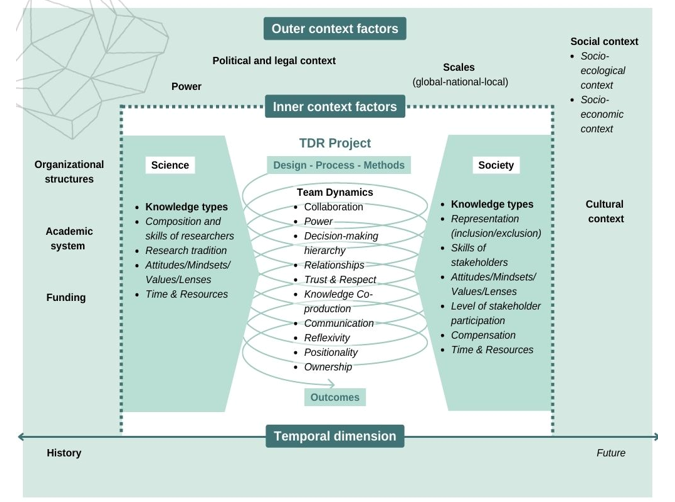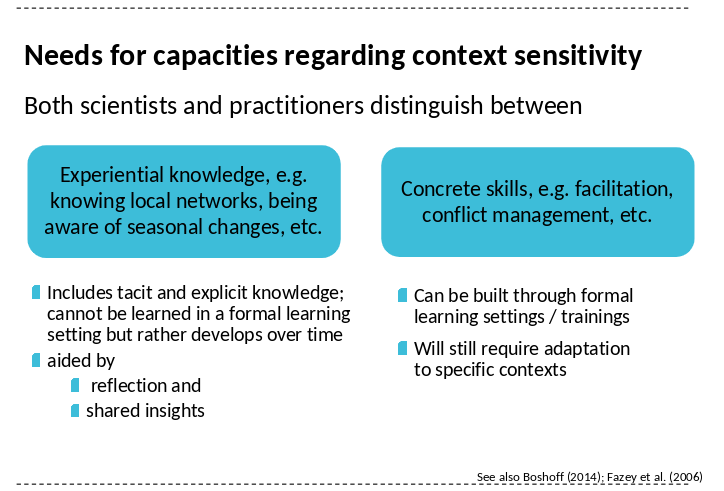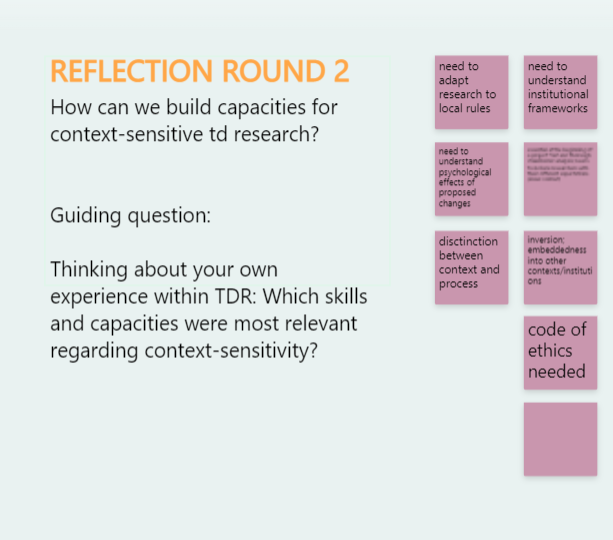On November 28 2022, the Leuphana research team (Daniel Lang, Claire Grauer, Farina Tolksdorf and Theresa Seidel) organized a 2-hour online workshop as part of topic line 3 to reflect on contextual dependencies in transdisciplinary research. The target audience of the format were researchers, practitioners as well as integration experts of transdisciplinary research projects. 20 participants from different countries and various fields took part.
The workshop was conducted as part of the in-depth study on contextual dependencies in transdisciplinary research. The goal of the in-depth study is to gain a better understanding of contextual dependencies in transdisciplinary research and identifying needs for capacity-building for both researchers and practitioners. The workshop included presentations from the research team, two breakout sessions and plenary discussions.
In the first part of the workshop the research team presented the previous research results of topic line 3 including the tentative context framework (see below). The team sought feedback on whether participants found this of practical use for transdisciplinary research. While participants found it useful in general, they also made suggestions for further refinement. For example, some pointed out that distinction between inner and outer factors does not represent the existing layers of context. Others found the use of the analytical division between “science” and society” as depicted in the framework as misleading, because in reality it is not as clear cut as the model seems to imply. In terms of the practical use of the context model for transdisciplinary projects, participants responded they would find the framework useful when accompanied by a set of guiding questions.

Framework of 12 context factors. (Tolksdorf et al., in preparation)
In the second part of the workshop, the discussion revolved around how capacities for context-sensitive transdisciplinary research can be built. First, the team presented needs for context sensitivity that could be derived through the teams’ empirical research. Both scientists and practitioners benefit from having experiential knowledge and concrete skills.

Furthermore, capacity building can be addressed on several levels: the individual level, the project level and on the level of groups and collectives. The research team proposed to use the tdAcademy’s context framework (see above) to create a context check list to support context sensitivity.
In the second reflection round the participants discussed about which skills and capacities they regard as most relevant regarding context-sensitivity – a question that proved difficult to answer. Yet, a wide range of competencies and capacities were mentioned, such as stakeholder mapping, project management skills, creating a code of ethics for transdisciplinary research and understanding the institutional context.

In the final plenary discussion, participants discussed about how we can better access context, including the question how we can generate and access concrete data on context. Another question that came up was to which extent context relates to a lack of science communication and if we need better ways to feeding back knowledge into science. Furthermore, it was stated that the td-community needs to better understand practitioners and their needs. In addition, it was called for improving the link between academia and extra-academic sectors.
Overall, participants reported they enjoyed the workshop because they gained some insights into tdAcademy’s research and had the opportunity of engaging with other people interested in transdisciplinary research. The organisers, too, were happy with the feedback and would again like to thank the participants for taking the time to participate and contribute to the success of our event.
